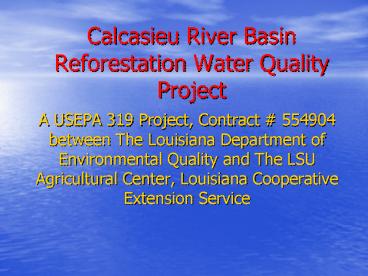Calcasieu River Basin Reforestation Water Quality Project - PowerPoint PPT Presentation
1 / 69
Title: Calcasieu River Basin Reforestation Water Quality Project
1
Calcasieu River Basin Reforestation Water Quality
Project
- A USEPA 319 Project, Contract 554904 between
The Louisiana Department of Environmental Quality
and The LSU Agricultural Center, Louisiana
Cooperative Extension Service
2
Use of Wood Ash/Wood FiberMix to Reduce
Erosionat Reforestation Sites
- Rod Hendrick
- LSU Agricultural Center
- Principal Investigator
3
Pine Forests are long term stable environments
4
Except during and just after harvesting
5
During and following harvest the disturbed soil
is open to erosion
6
However, wood fiber residue from paper production
7
And wood Ash Residue from Waste to Energy at the
Paper Mill
8
When mixed make a Mulch
9
That offers good surface protection
10
Surface Applications of mulch to Reforestation
Sites Should
- Reduce Erosion
- Reduce plant competition with seedlings
- Improve soil moisture
- Return nutrients to the soil
- Increase available soil phosphorous
- Increase soil organic matter
- Convert a waste to an environmental asset
11
In the Calcasieu River Watershed
- Over 80 of the upper basin is forest production
- The soil is low in phosphorous, organic matter,
calcium and other nutrients - The soil pH is low
- The soil is sandy and highly erodadable
12
The Calcasieu Reforestation Project was designed
to
- Measure the ability of a wood ash/wood fiber
mixture applied to the surface to - Reduce soil loss during the planting period
- Improve soil moisture levels during the first
year after planting - Increase the availability of soil phosphorous
- Return nutrients to the soil
- Improve seedling survival and growth
13
A Recently Harvested Site was Selected at Slagle
in Vernon Parish
14
(No Transcript)
15
The Experimental Design from the Grant Proposal
and Contract was followed
- Four Treatments were used
- Untreated-Check
- 10 tons of wood ash/wood fiber (11)/ Acre
- 15 tons of wood ash/wood fiber /Acre
- 20 tons of wood ash/wood fiber /Acre
- Each treatment was replicated 3 times in a
Randomized Block Design
16
Plots were laid out and marked
17
Plot layout at Slagle
18
Weather Postponement
- During soil sampling in February 2000 it was
realized that with the soil being so dry from 2
years of drought that a 5 pound hammer was needed
to get a 3 inch core, that seedling survival
would be too poor to generate reliable data. The
decision was made to postpone a year and hope for
better conditions the next year. LDEQ concurred
with this decision.
19
2001 Study
- January 2001 the plots were relocated and the
original site used since a suitable fresh site
could not be located. - Mulch was mixed and brought to the site.
- A side-throw spreader was located, brought to the
site and calibrated.
20
Mulch being applied with a Knight side discharge
spreader
21
Soil Moisture was much improved
22
Soil Moisture brings its problems
23
The Application Rate was monitored
- 10 tons per acre
- 10 tons per acre soil coverage
24
- 15 tons per acre
- 15 tons per acre soil coverage
25
- 20 tons per acre
- 20 tons per acre soil coverage
26
The mulch sticks where it hits
27
Vegetation recovered quickly during 2000
28
ISCO Automatic Samplers were installed in the
streams
- Calcasieu River above the test site
29
On the Calcasieu above the test site-SW 1
On the Calcasieu River above the test site-SW-1
- Calcasieu River above the test site
30
Stream draining the test site-SW2
31
Solar collectors and rain gauges were used on
both samplers
32
Installing Isco Sampler in lockable box
33
Barrel installation with help
34
Flume and collection barrel
35
Detail of Flume showing water collector
36
Without the pipe and anchors the wet sand pushed
the barrels out
37
Wet sand tends to flow
38
Site 1, 5-30, 2001
39
Site 2- May 31, 2001
Site 2, 5-30, 2001
40
The ISCOs Samplers were set to collect samples
from 2 inch rains
- Tropical Storm Allison was the first 2 rain
Tropical Storm Allison was the first 2 inch rain.
Site 1, 6-7, 2001
41
Site 2, 6-7, 2001
42
It proved difficult to collect the samples timely
It proved difficult to collect the samples in
timely manner
43
Water Sampling Procedure
- The procedure for collecting water samples from
the plots was validated as described in the QAPP. - Collection of samples from the ISCO samplers was
less involved. - Samples were refrigerated after collection.
44
In plot water collector after rain event
45
Tube from flume was drained into barrel
46
The lid was removed and barrel contents agitated
with battery powered pump
47
Agitating barrel contents to suspend solids and
mix sample
48
(No Transcript)
49
Collecting sample in 1 liter bottle
50
Measuring seedlings in 1/10 Acre
51
Flume set after Allison
52
Cleaning flume after rain event
53
Cleaning collection tube
54
Rinsing tube with distilled water
55
Cleaned flume
56
Data Collection
- Soil and water samples were collected and
analyzed using methods and procedures approved in
the QAPP. However, since they were collected
prior to QAPP approval, they are considered
preliminary and are shown for information only.
57
(No Transcript)
58
(No Transcript)
59
(No Transcript)
60
(No Transcript)
61
(No Transcript)
62
(No Transcript)
63
(No Transcript)
64
(No Transcript)
65
(No Transcript)
66
(No Transcript)
67
(No Transcript)
68
(No Transcript)
69
Vegetation Re-growth continued in 2001































